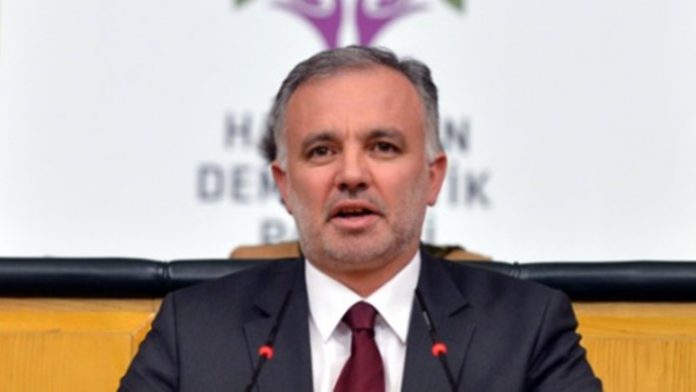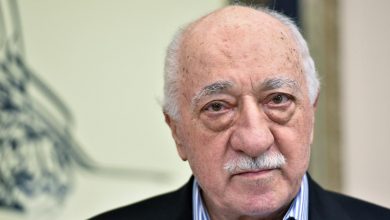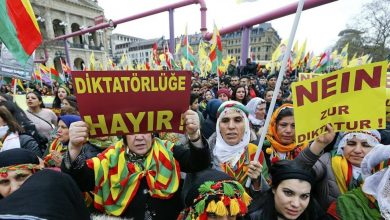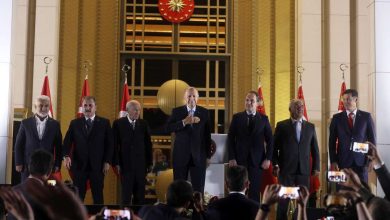Recent arrests aimed at preventing pro-Kurdish HDP from entering elections, former mayor claims
On September 25 a detention order was issued for HDP Kars Co-mayor Bilgen and 81 other politicians from the pro-Kurdish party by the Ankara Chief Public Prosecutor’s Office.

Ayhan Bilgen, a former co-mayor from the pro-Kurdish Peoples’ Democratic Party (HDP) who was recently arrested along with 16 other party officials, told BBC Türkçe that operations targeting HDP members are aimed at laying the legal groundwork to prevent the party from entering elections.
“I’m of the opinion that [through recent operations on HDP officials] they [the ruling Justice and Development Party (AKP)] are not trying to shut down the HDP, but rather lay the groundwork for new regulations to prevent the party from entering elections and receiving financial support,” Bilgen told Ayşe Sayın from BBC Türkçe on Friday in Ankara’s Sincan Prison, where he is currently being held.
On September 25 a detention order was issued for HDP Kars Co-mayor Bilgen and 81 other politicians from the pro-Kurdish party by the Ankara Chief Public Prosecutor’s Office.
The order was based on their alleged role in protests in Kurdish majority cities against what is seen by many as the Turkish government’s tacit approval of the Kobane siege in 2014, when Islamic State in Iraq and the Levant (ISIL) militants laid a prolonged siege to a Kurdish town in northern Syria.
Police reportedly detained 20 politicians and a court arrested 17 of them earlier in October, releasing former HDP deputies Altan Tan and Sırrı Süreyya Önder and HDP member and feminist author Gülfer Akkaya. Among those arrested were Bilgen and former MPs Emine Ayna, Nazmi Gür and Beyza Üstün.
Former co-chairs of the party Selahattin Demirtaş and Figen Yüksekdağ have been jailed since November 2016 on similar charges.
After Bilgen’s arrest, President Recep Tayyip Erdoğan’s AKP government removed him from office and appointed Kars Governor Türker Öksüz as a trustee to replace him.
The move decreased the number of mayoralties run by the HDP to six municipalities out of the 65 the party won in the March 2019 polls. Among the six municipalities, none of them represents provinces, but instead districts and towns.
Bilgen described the recent operations targeting the pro-Kurdish officials as “a blow to faith in the ways of the democratic struggle in Turkey.”
The former mayor had been arrested on the same charges in 2017 and was released seven months later with a ruling by the Constitutional Court (AYM).
“It was a move against the basic principles of law ordered [by the Erdoğan administration] with the intention of replacing me with a state-appointed trustee. The new case file includes no solid new evidence against me,” Bilgen told BBC regarding his recent arrest.
Commenting on Turkish opposition parties’ criticism that the latest operations on HDP officials were “politically motivated,” Bilgen underlined that any perception operation aimed at criminalizing the HDP also involves a message for all other opposition parties.
“Criticizing this operation [against the HDP] is not about defending me, my friends or the party. It’s about defending law and democracy,” the jailed former mayor added.
Ankara’s recent crackdown on pro-Kurdish politicians was also denounced by Human Rights Watch (HRW) and the Council of Europe (CoE).
Tom Porteous, deputy program director at HRW, defined the arrests as the latest example showing that Turkey’s courts are all “too quick to do the government’s bidding.”
“Detaining politicians from a party that won nearly 12 percent of the vote in 2018 general election is part of the Turkish government’s policy to criminalize political opposition,” he further said.
Ankara accuses the HDP of links to the terrorist Kurdistan Workers’ Party (PKK), a Kurdish group designated by Turkish government as a terrorist organization that has waged a separatist insurgency against the Turkish state since 1984.
The controversial practice of removing and arresting mayors was also widely implemented during Turkey’s two-year-long state of emergency following an attempted coup in 2016.
Source: Turkish Minute




